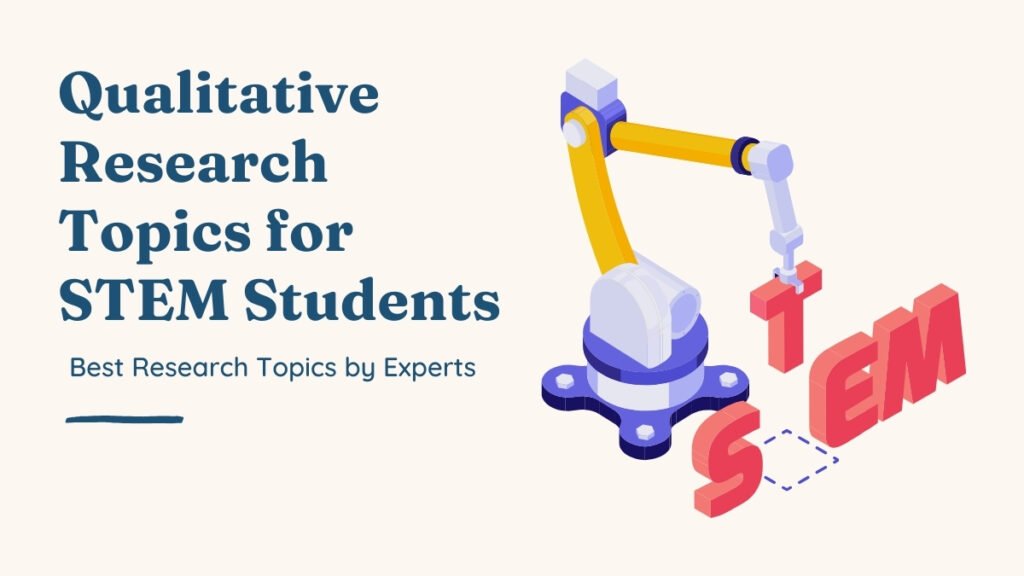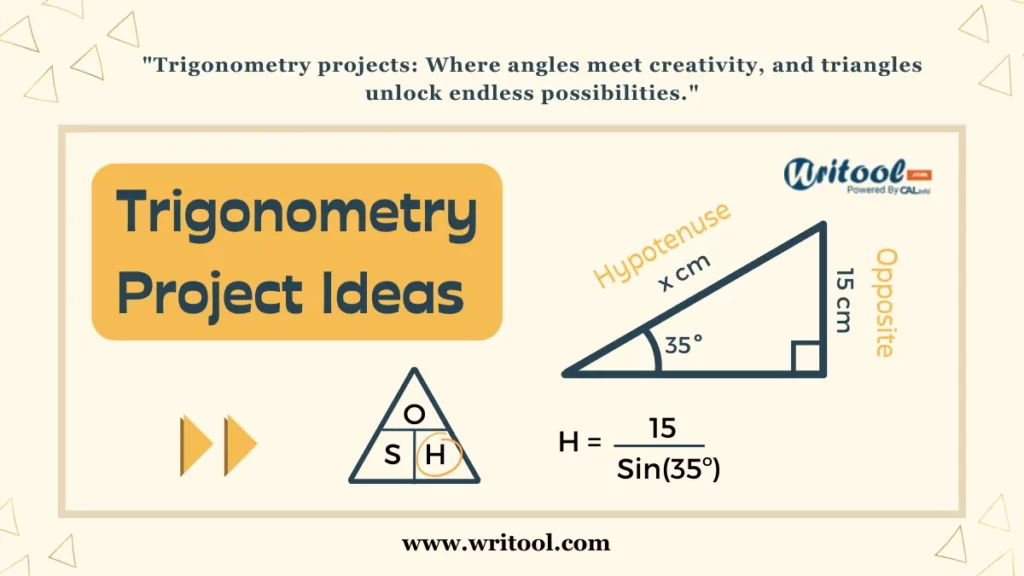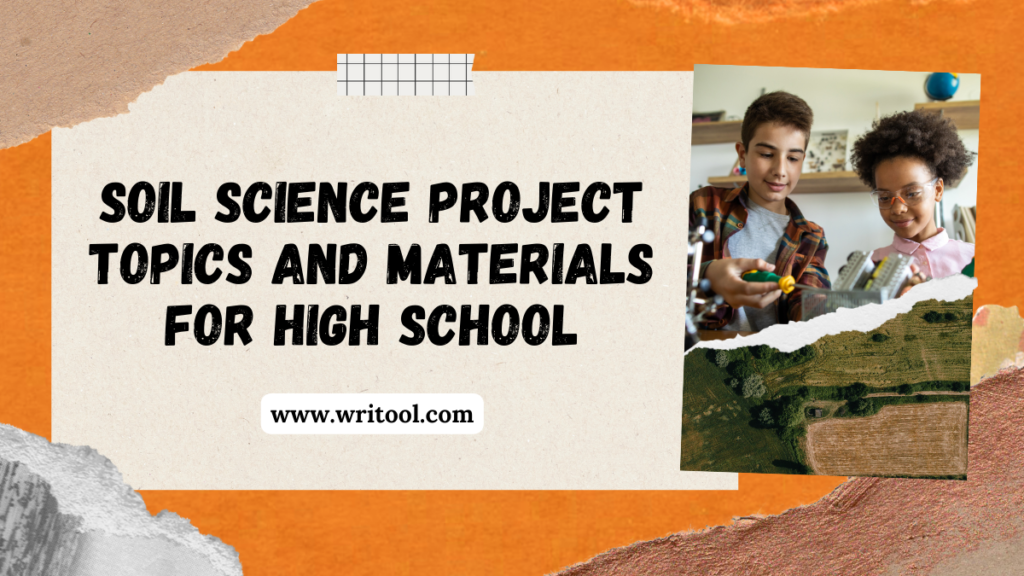Explore compelling qualitative research topics for STEM students, delving into personal narratives, ethical dilemmas, and educational impacts across science, technology, engineering, and mathematics.
STEM disciplines traditionally focus on equations, experiments, and empirical evidence. Yet, the human dimension of these fields profoundly shapes their evolution and application.
Qualitative research thus becomes pivotal in unraveling the motivations behind scientific breakthroughs, examining personal stories, perspectives, and educational influences that mold STEM practices.
From uncovering the inspirations driving young scientists to navigating ethical quandaries in technological advancements, and exploring how science education impacts diverse communities, qualitative research offers a rich tapestry of insights into STEM’s human aspect.
This guide curates intriguing qualitative research topics that illuminate the personal narratives within science, technology, engineering, and mathematics. Embark on a journey to uncover the human stories behind STEM!
Qualitative Research Topics for STEM Students PDF
Qualitative Research Topics for STEM Students
Check out qualitative research topics for STEM students:-
Biology
City Birds: How Urban Growth Affects Wildlife
Project Idea: Explore how cities impact bird populations. Use birdwatching and community surveys to track species diversity in urban areas versus natural habitats.
Innovative Approach: Create a citizen science project where local residents and schools monitor bird populations in their neighborhoods using a mobile app.
Ethics in Animal Research: Balancing Science and Welfare
Project Idea: Investigate ethical dilemmas in animal research. Interview scientists and activists to understand perspectives on humane treatment and alternative methods.
Innovative Approach: Organize a debate or public forum where students role-play different stakeholders (scientists, ethicists, animal rights advocates) to discuss and propose solutions.
Healing Plants: Traditional Knowledge Meets Modern Science
Project Idea: Document traditional uses of medicinal plants. Interview healers and botanists to explore their knowledge and conservation efforts.
Innovative Approach: Create an interactive digital archive showcasing interviews, plant specimens, and stories from local communities about medicinal plants.
Community Conservation: Engaging Locals in Wildlife Protection
Project Idea: Study community perceptions of conservation efforts. Interview residents and conservationists to assess awareness and participation in local wildlife conservation projects.
Innovative Approach: Host a virtual reality (VR) experience where participants explore a simulated wildlife reserve, learning about conservation challenges and solutions.
Save the Bees: Investigating Pollinator Decline
Project Idea: Research factors contributing to pollinator decline. Analyze pesticide use and habitat loss impacts on bee populations through fieldwork and stakeholder interviews.
Innovative Approach: Develop an educational board game where players must balance farming practices with bee conservation efforts, raising awareness through interactive gameplay.
Chemistry
Chemical Safety at Home: What’s in Your Products?
Project Idea: Survey public attitudes towards chemical safety in household products. Analyze labeling and consumer preferences for eco-friendly alternatives.
Innovative Approach: Create an Instagram campaign where participants share photos and reviews of safe household products, promoting awareness and informed consumer choices.
Green Innovations: Sustainable Solutions for Small Businesses
Project Idea: Interview small business owners adopting green chemistry practices. Analyze case studies of successful eco-friendly startups and their impact on sustainability.
Innovative Approach: Organize a “Green Shark Tank” event where students pitch eco-friendly product ideas to local entrepreneurs and sustainability experts for feedback and support.
Waste Not, Want Not: Recycling Chemicals for a Cleaner Future
Project Idea: Investigate chemical waste recycling practices. Interview engineers and policymakers to understand challenges and innovations in recycling technologies.
Innovative Approach: Design a virtual reality experience where users explore a recycling plant, learning about chemical waste processes and environmental benefits.
Fun with Chemistry: Enhancing Education through Interactive Learning
Project Idea: Evaluate educational resources in chemistry. Interview teachers and students to assess the effectiveness of hands-on experiments and digital simulations.
Innovative Approach: Develop a mobile app featuring interactive chemistry tutorials and virtual labs, making learning engaging and accessible outside the classroom.
Ethical Chemistry: Ensuring Safety and Responsibility in Research
Project Idea: Explore ethical considerations in chemical research. Interview researchers to discuss issues like data integrity and public trust in scientific studies.
Innovative Approach: Host a podcast series where scientists share personal stories and ethical dilemmas encountered in their research, encouraging open dialogue and critical thinking.
Physics
Space Explorers Unite: Inspiring the Next Generation of Astronauts
Project Idea: Engage the public in space exploration. Host workshops where participants design and build model Mars rovers, learning about planetary exploration challenges.
Innovative Approach: Collaborate with local artists to create a mural depicting humanity’s journey into space, sparking curiosity and wonder in the community.
Power of the Future: Exploring Renewable Energy Solutions
Project Idea: Investigate public perceptions of renewable energy. Interview engineers and policymakers about solar and wind power adoption and community benefits.
Innovative Approach: Organize a renewable energy fair where students showcase DIY solar panel projects and energy-efficient designs, promoting sustainable practices in everyday life.
Quantum Quest: Discovering the World of Quantum Mechanics
Project Idea: Explore applications of quantum mechanics. Interview physicists and tech innovators to understand quantum computing and cryptography advancements.
Innovative Approach: Create an augmented reality (AR) experience where users interact with quantum particles, learning about their unique properties and potential applications.
Particle Pioneers: Ethical Challenges in Accelerating Discoveries
Project Idea: Discuss ethical dilemmas in particle physics. Host a mock UN summit where students negotiate international agreements on particle accelerator safety and collaboration.
Innovative Approach: Organize a live-streamed virtual tour of CERN, featuring interviews with physicists and behind-the-scenes footage of particle research, engaging global audiences in scientific exploration.
Physics in Everyday Life: From Curiosity to Practical Applications
Project Idea: Explore public understanding of scientific methods. Survey community attitudes towards physics concepts like energy conservation and climate change solutions.
Innovative Approach: Create a YouTube channel featuring physics experiments and explanations in everyday contexts, making complex concepts accessible and engaging for viewers of all ages.
Engineering
Virtual Ventures: Designing Immersive Experiences in Virtual Reality
Project Idea: Develop user-friendly VR applications. Conduct user tests to improve interface design and user engagement in virtual environments for education and entertainment.
Innovative Approach: Collaborate with local museums to create VR exhibits where visitors explore historical landmarks or futuristic cities, blending technology with cultural heritage.
Green Cities, Bright Future: Innovating Sustainable Urban Solutions
Project Idea: Interview urban planners and engineers about green infrastructure. Analyze case studies of eco-friendly buildings and transportation projects promoting urban sustainability.
Innovative Approach: Partner with city officials to host a hackathon where students propose green tech solutions like smart traffic lights and energy-efficient public spaces, fostering creativity and civic engagement.
Medical Marvels: Exploring Ethics in Biomedical Engineering
Project Idea: Investigate ethical issues in medical technology. Interview biomedical engineers and healthcare professionals about patient privacy and ethical treatment in device development.
Innovative Approach: Create a podcast series featuring interviews with medical innovators discussing breakthroughs in prosthetics and bioengineering, inspiring ethical considerations in healthcare.
Engineering Education Evolution: Enhancing Learning through Innovation
Project Idea: Evaluate engineering education programs. Survey students and educators to identify effective teaching methods and technological tools for promoting hands-on learning and career readiness.
Innovative Approach: Launch a student-led engineering club focused on building sustainable solutions for local challenges, fostering collaboration and real-world problem-solving skills.
Robotics Revolution: From Factory Floors to Everyday Life
Project Idea: Interview robotics experts about automation’s impact. Analyze case studies of robotic applications in industries like manufacturing and healthcare, exploring technological advancements and societal benefits.
Innovative Approach: Organize a robotics expo where students showcase DIY robots and automation projects, demonstrating their practical applications in improving daily tasks and industry efficiency.
Computer Science
Cyber Sleuths: Protecting Online Privacy and Security
Project Idea: Investigate cybersecurity awareness. Conduct workshops and simulations to educate users about phishing scams and data protection strategies in digital environments.
Innovative Approach: Design an interactive mobile app where players solve cybersecurity puzzles and learn encryption techniques, promoting digital literacy and safe online practices.
Mobile Magic: Designing User-Centric Apps for Everyday Needs
Project Idea: Develop intuitive mobile applications. Conduct usability tests and gather feedback from diverse users to enhance app functionality and user experience.
Innovative Approach: Collaborate with local businesses to create an app promoting sustainable shopping habits or community events, integrating social features and real-time updates for users.
AI Ethics: Navigating the Moral Landscape of Machine Learning
Project Idea: Discuss ethical dilemmas in AI research. Host a virtual panel discussion where experts debate topics like bias in algorithms and AI’s impact on job markets and privacy.
Innovative Approach: Create an AI chatbot that educates users about ethical AI practices and prompts discussions on social media platforms, encouraging ethical considerations in technology use.
Digital Classrooms: Enhancing Learning through Online Platforms
Project Idea: Evaluate online learning tools. Survey students and educators to assess the effectiveness of digital resources like interactive tutorials and virtual labs in enhancing STEM education.
Innovative Approach: Develop a gamified learning platform where students collaborate on coding challenges and STEM projects, earning points and badges for problem-solving skills and teamwork.
Tech Transformation: Embracing Digital Disruption for a Better Tomorrow
Project Idea: Investigate public perceptions of digital transformation. Interview tech leaders and policymakers about innovations like smart cities and digital healthcare solutions.
Innovative Approach: Host a virtual reality tour of a futuristic city, showcasing sustainable technologies and smart infrastructure designs, inspiring communities to embrace digital advancements for a more connected future.
Mathematics
Math Masters: Exploring Creative Problem-Solving Techniques
Project Idea: Engage students in math challenges. Organize math competitions or puzzle-solving events to promote teamwork and critical thinking in solving real-world problems.
Innovative Approach: Create an online platform where users solve daily math puzzles and earn rewards, fostering a community of math enthusiasts and lifelong learners.
Beauty in Numbers: Appreciating the Artistry of Mathematics
Project Idea: Explore mathematical beauty. Host an art exhibit featuring mathematical patterns and sculptures, educating visitors about symmetry and fractals in nature and art.
Innovative Approach: Develop an augmented reality app where users interact with virtual mathematical sculptures, exploring their aesthetic qualities and historical significance.
Math Ethics: Ensuring Integrity and Responsibility in Research
Project Idea: Discuss ethical issues in mathematical research. Host a webinar series where mathematicians and scholars debate topics like data privacy and intellectual property rights in mathematical discoveries.
Innovative Approach: Create a podcast series featuring interviews with mathematicians sharing stories of ethical challenges and breakthroughs in their research, promoting ethical awareness and academic integrity.
Learning Beyond Limits: Enhancing Mathematics Education
Project Idea: Evaluate math education strategies. Survey teachers and students about effective learning methods like interactive lessons and peer tutoring in improving math comprehension and engagement.
Innovative Approach: Develop a virtual classroom platform where students attend math workshops and practice sessions with AI tutors, receiving personalized feedback and progress reports.
Mathematics in Action: Solving Real-World Challenges with Numbers
Project Idea: Investigate math applications. Collaborate with engineers and scientists to analyze case studies of mathematical modeling in fields like climate science and financial forecasting.
Innovative Approach: Launch a YouTube channel featuring animated videos explaining mathematical concepts and their practical applications in everyday life and global issues.
Importance of qualitative research in STEM fields
STEM fields (Science, Technology, Engineering, and Mathematics) focus on data and experiments, but qualitative research adds crucial depth by:
Revealing Human Experiences
It explores motivations and challenges within STEM, like why students lose interest in science or how ethics affect engineering decisions.
Informing Inclusive Practices
By understanding diverse perspectives, it helps create inclusive environments in STEM, addressing issues like gender disparities in engineering.
Examining Societal Impacts
It studies public perceptions of technologies (e.g., AI) and ethical concerns in STEM, guiding responsible development.
Understanding the “Why” Behind Data
It complements quantitative research by explaining reasons behind trends, like declining interest in science among students.
Fueling Innovation
By focusing on human insights, it inspires new technologies and strategies to support future STEM leaders.
In conclusion, qualitative research in STEM enriches understanding by exploring human dimensions, ensuring advancements are ethical, inclusive, and impactful.
Benefits of conducting qualitative studies alongside quantitative approaches
There are several benefits to integrating qualitative studies with quantitative approaches in research, especially in STEM fields. Here are the key advantages:
Richer Understanding
Quantitative data provides “what” and “how much,” while qualitative research (interviews, focus groups) uncovers “why” and “how.” This combination offers a holistic view, revealing underlying factors behind trends like declining student interest in science.
Uncovering Hidden Meanings
Quantitative data can lack context. Qualitative research adds meaning by exploring motivations, challenges, and perspectives, helping to interpret quantitative results accurately.
Generating New Questions and Hypotheses
Quantitative studies identify trends, and qualitative research refines findings and generates new research questions. For instance, survey data on poor science teaching can be explored qualitatively to identify effective teaching methods.
Informing Intervention Strategies
Quantitative research quantifies problems, while qualitative insights guide interventions. For example, understanding student interests can shape more relevant science curricula.
Enhancing Generalizability
Quantitative findings are statistically generalizable, and qualitative research provides insights into specific experiences, helping to assess applicability across different contexts.
Understanding Qualitative Research in STEM
Qualitative research offers a unique perspective on the human aspects of STEM fields (Science, Technology, Engineering, and Mathematics), focusing on experiences and meanings rather than numbers. Here’s a simplified breakdown:
Characteristics
Methods: Uses interviews, focus groups, and observations.
Focus: Explores experiences, perceptions, and contexts.
Approach: Inductive, allowing themes to emerge naturally.
Comparison with Quantitative Research
Quantitative: Deals with measurable data and hypotheses.
Qualitative: Focuses on meanings and narratives.
Applications in STEM
Understanding Motivations: Explores why people choose STEM careers or public perceptions of new technologies.
Social Context: Examines how culture, gender, and background affect STEM participation.
Ethical Analysis: Studies societal impacts of technologies like AI and genetic engineering.
Educational Insights: Evaluates teaching methods and student experiences in STEM.
In summary, qualitative research complements quantitative methods by providing insights into the human dimensions of science and technology.
Choosing a Qualitative Research Topic for STEM Students
STEM students excel in numbers and equations, yet science is deeply intertwined with human experience. Qualitative research explores this intersection, uncovering the “why” and “how” behind scientific phenomena. Here’s how to choose an engaging topic:
Find Your Passion: Identify what excites you in STEM, like robotics or clean energy.
Explore Human Impact: Consider how your STEM interest connects with human behavior or societal impacts. For instance, public views on robots in healthcare.
Identify Gaps: Look for unexplored areas in STEM education or technology development.
Topic Ideas
Motivations and Challenges
What drives students into STEM careers?
Challenges faced by minorities in STEM fields.
Learning and Engagement
Impact of teaching methods on student interest.
Strategies for scientific literacy in diverse communities.
Societal Impact
Ethical influences on AI development.
Bridging the digital divide for equitable technology access.
Tips
Focus & Feasibility: Choose a specific yet manageable topic.
Data Collection: Plan interviews, focus groups, or observations.
Ethics: Respect participant privacy and consent.
Selecting a compelling topic in qualitative research can offer valuable insights into STEM’s evolving landscape.
Conclusion
Qualitative research helps STEM students explore how science, technology, engineering, and mathematics connect with people’s lives and society.
By studying experiences and stories, students gain a deeper understanding of ethics and societal impacts. This not only boosts their research skills but also prepares them to innovate thoughtfully for a more inclusive future in STEM.
Remember, choose a topic that truly interests you and sparks curiosity—something that can uncover meaningful insights!


